Coffee, a staple in many cultures worldwide, is consumed by countless individuals daily. Some people start their day with a cup of joe, while others enjoy a warm mug in the afternoon.
Amid the enjoyment of this popular beverage, some have wondered whether coffee is considered a food or if it falls strictly into the beverage category.
To classify coffee as a food, we must consider its nutritional components.

Black coffee contains micronutrients such as manganese, magnesium, potassium, sodium, riboflavin, niacin, and sodium, which are crucial for fighting off diseases and maintaining a healthy body.
While coffee does indeed have nutritional value, it’s important to understand its potential risks and benefits for health.
Key Takeaways
Coffee has nutritional components, which may qualify it to be considered a food
There are health benefits as well as potential risks associated with coffee consumption
The impact of additives in coffee and its role in a balanced diet also plays a part in the food versus beverage debate
Is Coffee Considered Food?
I’ve always wondered whether coffee is considered food or just a beverage. After doing some research, I found out that coffee drinks can actually be considered both!
As a drink, it’s consumed mainly for its taste and stimulant properties, while its calorie and nutrient content makes it a source of nutrition as well.
Coffee, especially the black variant, contains micronutrients such as manganese, magnesium, potassium, sodium, riboflavin, niacin, and sodium.
These vitamins and minerals are essential for fighting off diseases and maintaining a healthy body. So, in a way, coffee can be viewed as a food because of its nutritional components.
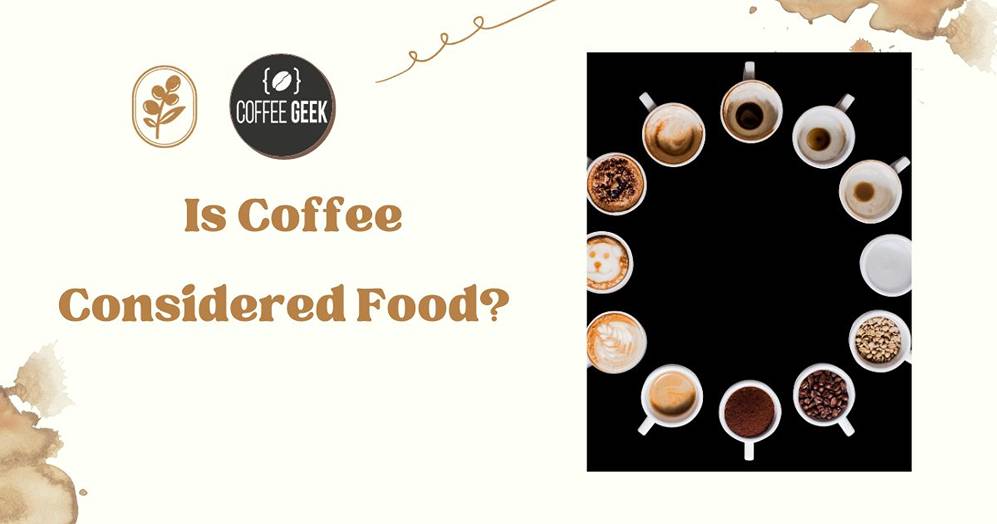
That being said, it’s interesting to note that coffee is not included in any of the USDA’s major food groups like dairy products, vegetables, fruits, grains, proteins, or fats and oils. Instead, it is classified as “calories for other uses.”
Apart from caffeine, which is known as a stimulant for the central nervous system, coffee also offers an antioxidant.
These antioxidants can help protect our body from free radicals, which are responsible for causing damage to our cells and increasing the risk of various diseases.
In conclusion, coffee can be considered both a beverage and a food due to its taste, nutritional components, and health benefits.
So, next time you enjoy a cup of coffee, remember that you’re also consuming some valuable nutrients that help keep your body healthy!
Exploring Coffee’s Identity
As a coffee lover, I’ve often wondered about coffee’s classification. Is it a food or just a beverage? To better understand this, let’s explore coffee in two different aspects: as a beverage and as a food.
Coffee as a Beverage
Coffee is primarily known as a beverage, and for good reason. The drink, made from the roasted seeds of coffee cherries, is enjoyed by people all around the world for its rich aroma, unique flavor, and stimulating effects.
The caffeine in coffee gives it a well-deserved position as a popular pick-me-up drink.

As a beverage, coffee is often consumed for its distinct taste or as part of a daily routine for an energy boost. It can be served hot or cold, and it comes in a variety of forms, including black coffee, espresso, cappuccino, latte, and more.
Some people even enjoy decaffeinated coffee, which allows them to enjoy the taste without the stimulating effects of caffeine and some people add it to alcoholic beverages.
Coffee as a Food
While it’s true that coffee is mostly seen as a beverage, and belongs to the drinks group, it does have some elements that qualify it as a food.
The roasted coffee beans, which are actually seeds from the coffee plant, contain nutrients and calories, making coffee beans a source of nourishment.
In its simplest form, black coffee contains micronutrients such as manganese, magnesium, potassium, sodium, riboflavin, niacin, and sodium.
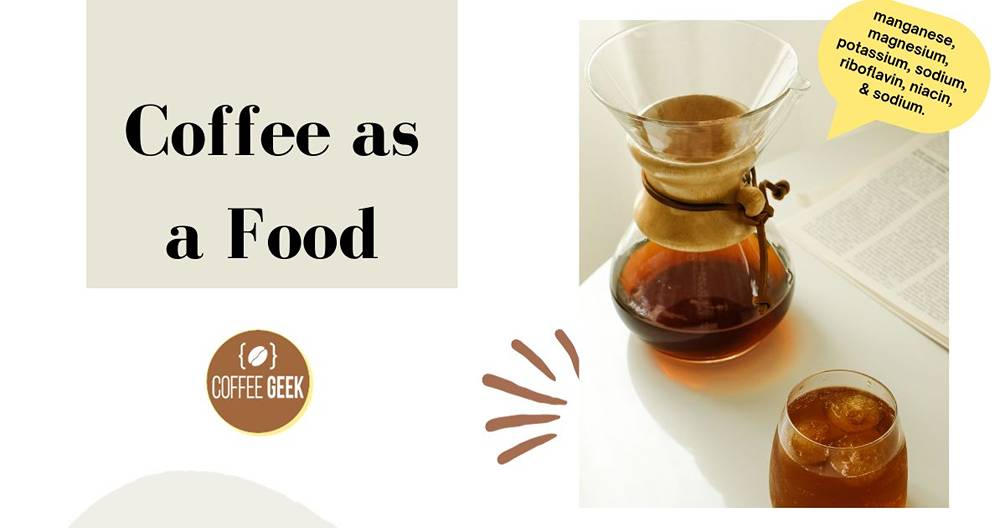
These nutritional components technically classify coffee as a food, albeit a very unique one.
In conclusion, coffee’s identity as a drink or food can be a matter of perspective. While it’s primarily consumed and enjoyed as a beverage, its nutritional components place it in the realm of food group as well.
As both a food and a beverage, coffee offers unique experiences and benefits that make it an essential part of our lives.
Nutritional Breakdown
Energy and Macro-Nutrients
When it comes to coffee, I find it fascinating that this beverage also has nutritional value.
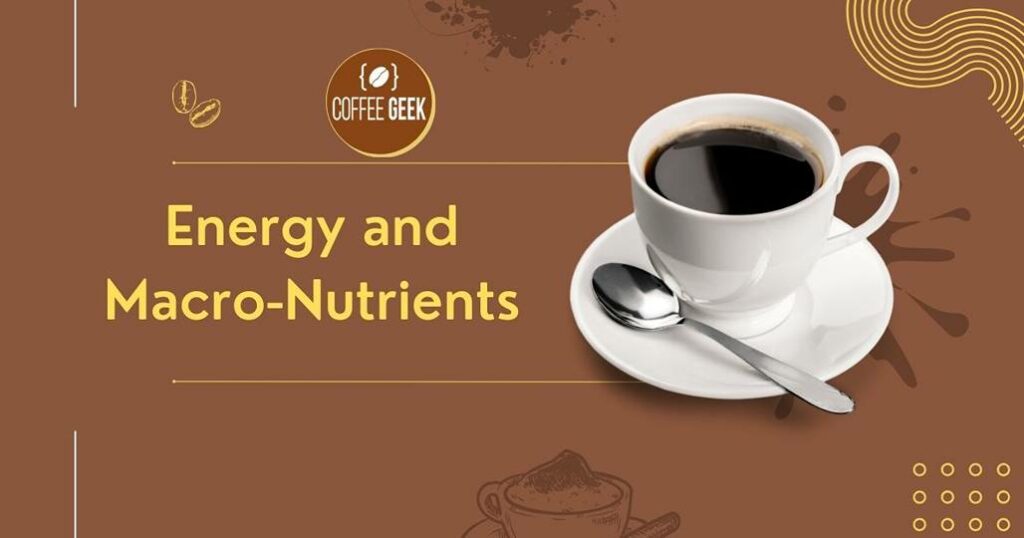
While black coffee has minimal calories, it does provide some energy, with only about 2 calories per 8-ounce cup and insignificant amounts of carbohydrates, fibers, and proteins.
It’s amazing how this morning pick-me-up cups can still fit into a calorie-conscious diet!
Vitamins and Minerals
Now, let’s talk about the micronutrients in coffee – vitamins and minerals that are essential for a healthy body.
I discovered that black coffee contains significant levels of manganese, magnesium, potassium, sodium, riboflavin, niacin, and more.
Manganese: This essential mineral aids in metabolism, bone formation, and antioxidant function.
Magnesium: It helps regulate blood pressure, support the immune system, and maintain nerve and muscle function.
Potassium: This mineral is crucial for maintaining fluid balance, proper nerve function, and muscle contractions.
Sodium: In moderate amounts, sodium helps maintain proper fluid balance and supports muscle and nerve function.
Riboflavin (Vitamin B2): Riboflavin plays a role in energy production and supports healthy skin, hair, and nails.
Niacin (Vitamin B3): Niacin is essential for energy production, metabolism, and maintaining healthy skin, nerves, and digestive systems.
In each 8-ounce cup of coffee, the nutritional values for these vitamins and minerals are as follows according to Verywell Fit:
Micronutrient Amount Sodium 4.8 mg Potassium 118 mg Magnesium 7.2 mg
As a coffee lover, I find it interesting that this popular beverage can offer such nutritional benefits.
So the next time I enjoy a cup, I know I’m not only waking up my brain but also getting a few essential nutrients in the process!
Health Benefits of Coffee Drinking
As a coffee lover, I’ve often wondered about the benefits of my daily caffeine fix. I’m glad to report that moderate coffee consumption can actually offer several health advantages.
For starters, coffee has been known to boost our metabolism, thanks to its caffeine. This helps us feel more energized and alert when we need it most.
Now, let’s talk about some major benefits for health. Drinking coffee might help lower the risk of stroke.
According to a Harvard study, consuming 2-5 cups of coffee a day is linked to a reduced likelihood of several diseases, including heart disease.
This means that our favorite morning drink might protect our hearts as well.
But that’s not all. Many of us worry about the risk of cancer, and it’s relieving to learn that coffee could also play a role in reducing this risk.
In particular, research has shown that coffee may reduce the risk of liver cancer and other cancers, such as endometrial cancer.
Perhaps one of the most well-known benefits for the health of coffee is its potential to decrease the likelihood of developing type 2 diabetes.
Once again, Harvard researchers found that those who drink coffee moderately are less likely to develop this condition.
In summary, as someone who enjoys coffee, I’m happy to know that my daily cup of joe might be benefiting my health in more ways than I initially thought.
With its potential to boost metabolism, and lower the risk of stroke, cancer, and type 2 diabetes, coffee consumption could be a valuable addition to a healthy lifestyle.
Potential Risks and Side Effects of Drinking Coffee
When it comes to coffee, I’ve noticed that there are some potential risks and side effects that are worth considering. It’s important to be aware of these, especially for those who consume a lot of coffee.
Effects on the Nervous System
One concern I’ve come across is the effect of caffeine on the nervous system. High caffeine intake can lead to restlessness and insomnia, making it difficult to relax and sleep, you stay awake.
Consuming too much coffee can also contribute to high blood pressure and even heart disease. As someone who enjoys a good cup of Joe, I always keep in mind that moderation is key.
Here are a few potential side effects of excessive coffee intake:
Restlessness: Too much caffeine can make it difficult to relax.
Insomnia: Difficulty falling asleep or staying asleep.
High blood pressure: Caffeine may temporarily raise blood pressure.
Heart disease: There is a possibility that excess coffee consumption could contribute to heart disease.
Implications for Pregnancy
Another important aspect of coffee consumption that I’ve learned about is its effects on pregnant individuals. During pregnancy, it’s recommended to limit caffeine intake.
High levels of caffeine have been associated with risks such as premature birth or low birth weight.
To enjoy coffee while pregnant, some considerations include:
Reducing caffeine intake: It’s best to consume no more than 200 mg of caffeine per day.
Choosing decaf: Opting for decaffeinated coffee is a great way to enjoy the taste without the extra caffeine.
Checking for sodium and artificial sweeteners: Keep an eye out for the presence of sodium and artificial sweeteners in some coffee products.
As a coffee enthusiast, I make sure to be mindful of the potential risks and side effects associated with coffee consumption, especially when it comes to pregnancy and the nervous system.
By staying informed and using moderation, I feel confident that I can enjoy my morning cup of coffee without worry.
| Aspect | Consideration |
|---|---|
| Nutritional Content | Coffee contains some nutrients, such as antioxidants and small amounts of vitamins and minerals, but it is not a significant source of nutrition. It lacks essential nutrients found in traditional foods. |
| Caloric Value | Coffee contains calories, primarily from the natural oils in coffee beans and any added ingredients like sugar or cream. However, its caloric contribution is usually minimal. |
| Satiety Factor | While coffee can temporarily suppress appetite, it does not provide the satiety that solid food does. It is not a substantial source of energy or sustenance. |
| Culinary Use | Coffee is commonly used as a beverage, not as a primary food item. However, it can be incorporated into recipes or desserts, blurring the line between a beverage and a food ingredient. |
| Cultural Perception | In many cultures, coffee is not considered a traditional food item but is deeply ingrained in social and cultural practices. It is more commonly viewed as a beverage or stimulant. |
The Impact of Coffee Additives
Sugar in Coffee
When it comes to adding sugar to coffee, it’s important to be mindful of the amount we consume.
We all love a little sweetness in our lives, but excessive sugar intake can lead to unwanted health consequences such as weight gain and an increased risk of developing type 2 diabetes.
Personally, I try to limit the amount of sugar I add to my coffee, opting for natural sweeteners when possible.
Milk, Cream and Other Dairy
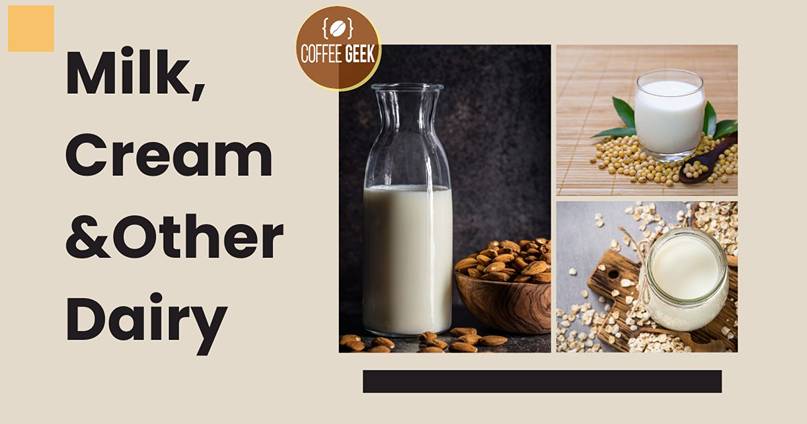
As for dairy products like milk and cream, they can provide some additional nutritional benefits to our coffee drinking. For instance, milk contains calcium and protein, which are essential for strong bones and overall health.
However, it is crucial to be aware of portion sizes, as adding too much dairy can also increase the calorie count of our coffee.
I’ve noticed that there are various dairy alternatives available, such as almond, soy, and oat milk, which are not only great for those who are lactose intolerant or have dietary restrictions but also offer unique flavor profiles to our favorite beverage.
How Coffee Fits into a Balanced Diet
When it comes to maintaining a balanced food plan, I always try to ensure that I’m consuming a variety of nutrients from different food groups.
One beverage that I enjoy and often wonder about is coffee. So, how does coffee drinking fit into a balanced diet?
Coffee, particularly black coffee, is actually considered a food due to its nutritional components, such as manganese, magnesium, potassium, sodium, riboflavin, niacin, and sodium.
Drinking coffee without added cream and sugar can even contribute to a 4% reduction in body fat when consuming four cups daily. However, moderation is key, as excessive caffeine intake can lead to negative side effects.
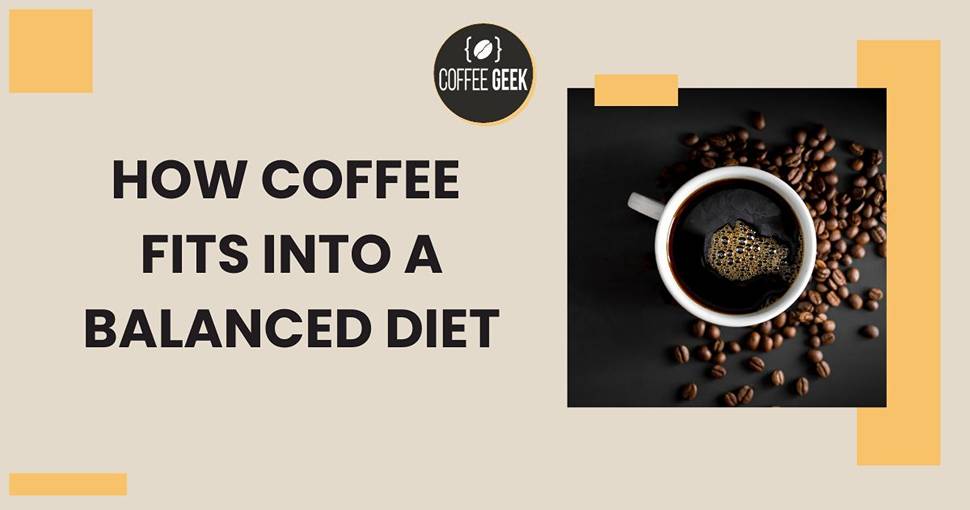
While coffee can be included in a balanced diet, it’s essential to consider other sources of nutrition too. A well-rounded food plan includes a variety of fruits, vegetables, lean proteins, and whole grains.
For instance, drinking water or tea in place of soda ensures I’m not overloading on unnecessary sugar.
I like to pair my coffee with a healthy snack, such as a piece of fruit, which provides essential vitamins and minerals while satisfying my sweet tooth. This combination keeps me energized and helps me stay on track with my balanced goals.
In conclusion, coffee can be a nourishing addition to a balanced diet when used wisely, without added sugars and creamers.
I make sure to savor each cup while being mindful of the other food groups that make up a well-rounded, healthy diet.
In Conclusion
The debate about whether coffee is considered functional food touches on various aspects of nutrition, biology, and culinary traditions.
While coffee is commonly used as a drink, its nutrients and bioactive compounds prompt a closer examination of its classification.
Frequently Asked Questions
What is the legal classification of coffee?
As a consumer, I often see coffee treated as a beverage, but it’s worth noting that it is considered food since it provides nourishment and sustenance to the body.
The nutritional components, like vitamins and minerals, contribute to our overall daily caloric intake.
Can coffee be regarded as a snack?
While coffee doesn’t satisfy hunger in the same way solid foods do, it can still be thought of as a light eat snack due to its nutritional components.
Its micronutrients, such as manganese, magnesium, potassium, and sodium, provide some benefits for our bodies.
However, I would recommend pairing it with a small, healthy food item to enhance its snack-like qualities.
Are there any food elements in coffee?
Yes, coffee does contain food elements in the form of micronutrients. In fact, black coffee specifically has essential vitamins and minerals, such as manganese, magnesium, potassium, sodium, riboflavin, niacin, and sodium.
These micronutrients from coffee plants help fight off diseases and maintain a healthy body.
Do medications treat coffee beans as food?
Caffeine, the primary active component of coffee bean, is considered a drug rather than food.
It’s a naturally occurring chemical compound found in coffee and cocoa beans, tea leaves, and several over-the-counter and prescription medications.
Thus, while coffee is treated like food due to its nutritional components, its caffeine content is treated more as a drug.
How is coffee different from a meal?
While coffee contains some micronutrients and provides a little energy, it shouldn’t be viewed as a meal replacement.
Meals typically consist of a balance of macronutrients (proteins, fats, and carbohydrates) to fuel our bodies and provide essential nutrients.
Coffee doesn’t offer these macronutrients and, as a beverage, can’t provide the same level of sustenance that a meal can, so can not be a meal replacement, used coffee grounds are rich in sugars, which comprise about half of their weight.
Is coffee considered junk food?
Coffee itself is not considered junk food because it contains micronutrients and can be part of a healthy diet.
However, when loaded with sugar, flavored syrups, and excessive amounts of cream, it might lose some of its nutrients, becoming closer to a sugary, high-calorie dessert.
Consuming coffee in moderation and with healthier add-ons can help prevent it from being categorized as junk food in my diet.

